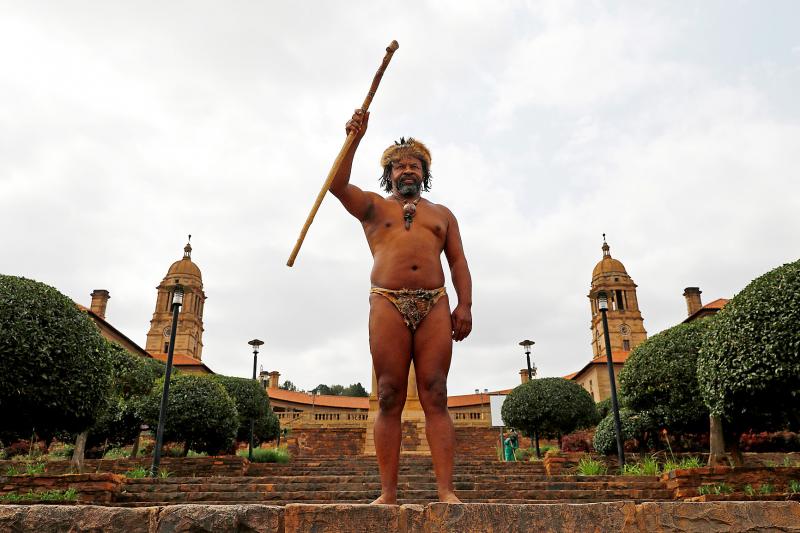A giant bronze statue of former South African president Nelson Mandela overlooks a big black tent that has become a fixture on the lawns of the South African president’s office in Pretoria.
The tent houses campaigners from the Khoisan community — South Africa’s first inhabitants, whose presence in the country has been dated by archeologists to thousands of years.
For the past two years, the protesters have been camping outside the seat of government, demanding official recognition of their languages and calling for talks over land ownership.

Photo: AFP
They also want the word “colored” — the mixed-race tag that they have been carrying since apartheid and which is still largely used in official documents — to be abolished.
The group came here in 2018, walking 1,000km, in a bid to secure an audience with the authorities.
“We will wait here until we have what we came for,” said one of their leaders, who calls himself “King Khoisan South Africa.”
Union Buildings is an imposing 110-year-old structure that has housed colonial, apartheid and democratic leaders including Mandela and now South African President Cyril Ramaphosa.
Placards in front of the tent bear various messages.
One has inscriptions in Afrikaans saying that Ramaphosa does not give a damn — “We have been here for more than one year and what does he do? Nothing.”
Ramaphosa last year signed into law the Traditional and Khoi-San Leadership Act, which grants more autonomy to the Khoisan community.
However, some of the Khoisan remain unsatisfied, and see the law as the starting point for a constitutional and cultural struggle.
It is unclear how many Khoisan there are, in a population of 59 million — and their identity is also a subject of debate.
“We talk about Khoi herders and San hunter-gatherers, but archeologically, it’s hard to tell them apart,” University of the Witwatersrand’s Origins Centre curator Tammy Reynard said.
This month, as South Africa marks its heritage month and attempts to recover from a COVID-19 pandemic lockdown, communities such as the Khoisan have been reflecting and questioning their fractured identity.
The Khoisan have been referred to in the past as “bushmen” — and when the Dutch settlers landed in South Africa in the 17th century, they called them Hottentots, a word derived from the famous clicks in their languages.
“Classified coloreds want to know who they are — they are coming together like never before,” Indigenous First Nation Advocacy SA founder Anthony Philip Williams said.
The virus “lockdown put a magnifying glass on the inequality that we have inherited,” said Denver Toroga, a Khoisan-language advocate and poet. “But I think it also helped us go beyond the need to acquire wealth and seek a different type of cultural wealth.”
The much-publicized issue of handing back farmland taken during white supremacy must include restitution for the Khoisan, as well as for black communities, King Khoisan said.
“You cannot talk about identity outside of land,” Williams said. “We must engage government for what is called a negotiated settlement. The resources of this land belong to our forefathers.”

‘IN A DIFFERENT PLACE’: The envoy first visited Shanghai, where he attended a Chinese basketball playoff match, and is to meet top officials in Beijing tomorrow US Secretary of State Antony Blinken yesterday arrived in China on his second visit in a year as the US ramps up pressure on its rival over its support for Russia while also seeking to manage tensions with Beijing. The US diplomat tomorrow is to meet China’s top brass in Beijing, where he is also expected to plead for restraint as Taiwan inaugurates president-elect William Lai (賴清德), and to raise US concerns on Chinese trade practices. However, Blinken is also seeking to stabilize ties, with tensions between the world’s two largest economies easing since his previous visit in June last year. At the
Nearly half of China’s major cities are suffering “moderate to severe” levels of subsidence, putting millions of people at risk of flooding, especially as sea levels rise, according to a study of nationwide satellite data released yesterday. The authors of the paper, published by the journal Science, found that 45 percent of China’s urban land was sinking faster than 3mm per year, with 16 percent at more than 10mm per year, driven not only by declining water tables, but also the sheer weight of the built environment. With China’s urban population already in excess of 900 million people, “even a small portion

UNSETTLING IMAGES: The scene took place in front of TV crews covering the Trump trial, with a CNN anchor calling it an ‘emotional and unbelievably disturbing moment’ A man who doused himself in an accelerant and set himself on fire outside the courthouse where former US president Donald Trump is on trial has died, police said yesterday. The New York City Police Department (NYPD) said the man was declared dead by staff at an area hospital. The man was in Collect Pond Park at about 1:30pm on Friday when he took out pamphlets espousing conspiracy theories, tossed them around, then doused himself in an accelerant and set himself on fire, officials and witnesses said. A large number of police officers were nearby when it happened. Some officers and bystanders rushed

Beijing is continuing to commit genocide and crimes against humanity against Uyghurs and other Muslim minorities in its western Xinjiang province, U.S. Secretary of State Antony Blinken said in a report published on Monday, ahead of his planned visit to China this week. The State Department’s annual human rights report, which documents abuses recorded all over the world during the previous calendar year, repeated language from previous years on the treatment of Muslims in Xinjiang, but the publication raises the issue ahead of delicate talks, including on the war in Ukraine and global trade, between the top U.S. diplomat and Chinese